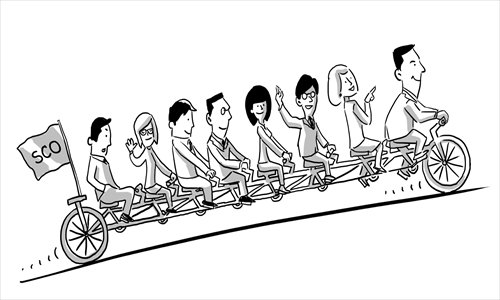SCO’s influence not yet fully unleashed

Illustration: Liu Rui/GT
2016 marks the 15th anniversary of the establishment of the Shanghai Cooperation Organization (SCO). By now, the regional international cooperation organization is entering its adolescence. At this exact moment, it is urgent to mull over new scenarios and requirements for the SCO based on its development history and subsequently propose new goals and missions.
The SCO has made remarkable achievements over the past 15 years. It calls for upholding the Shanghai Spirit of mutual trust, mutual benefit, equality, consultation, respect for cultural diversity and pursuit of common development, not only ensuring the healthy development of the organization but also indicating the direction for the development of new international relations in the post-Cold War period.
In addition, the organization has established a full set of cooperative mechanisms to guarantee the operation of the organization, further deepening the collaboration among various fields within the organization. It also helps intensify anti-terror cooperation and effectively crack down on the "three evil forces" of separatism, extremism and terrorism, ensuring the basic security of the SCO member states. It has issued a number of important documents on economic cooperation and launched collaboration in different arenas. A gratifying landscape where SCO members are committed to common development has gradually taken shape.
The SCO has grown to be an influential international organization and a significant player in regional and global governance. Nonetheless, its potential has yet to be fully released for a variety of complicated reasons, curbing it from wielding further influence upon the world at large.
The new era poses fresh challenges for the organization. It has started its expansion to South and West Asia. Then the establishment of the Eurasian Economic Union (EEU) created new challenges for SCO development. Prompting the two to cooperate instead of competing with each other has become an urgent task.
China's Belt and Road initiative, namely the Silk Road Economic Belt and the 21st Century Maritime Silk Road, has entered its implementation stage and five of its six economic corridors pass through SCO member states and observers. Sufficiently utilizing the existing cooperation mechanisms of the SCO to ensure the implementation of the Belt and Road initiative and connecting it with the EEU constitutes another critical task.
Islamic extremism has grown in the Middle East. Given the long shared border, similar cultures and languages between Middle East countries and SCO member states, Islamist extremists have enormous space to expand from the Middle East to Central Asia. The SCO is thus confronted with a severe threat from Islamic extremism and international terrorism.
In light of the massive vicissitudes and adjustments in international order, the SCO, as a regional cooperation organization where emerging countries gather, must spare no efforts to spread the idea of cooperation to create a win-win scenario and play a critical role in safeguarding the rights and interests of the developing world.
The transformation and adjustment in the diplomatic strategies of China and Russia have placed a more important task on the SCO, calling for it to play a major leading role in global governance in the new epoch.
To better perform new tasks, the SCO must make effort in many aspects to further consolidate the cohesion among its member states.
Its economic cooperation will no longer be constrained in the framework of a free trade zone.
Instead it should aim at creating a new Eurasian economic plate and developing a greater Eurasian economic partnership.
Security cooperation among the SCO member states will extend beyond cracking down on the three evil forces to resist neo-interventionism, geopolitical expansion and the impulse to wage war, restrain Islamic extremism from gaining ground and safeguard regional and global stability.
In political cooperation, the organization should give full play to its role as a responsible international organization, exert active and effective impact on major issues related to regional and global governance and in particular serve as a fundamental platform in gathering emerging nations, balancing the international strategic architecture and constructing the new international order.
And in cultural and people-to-people exchanges, the SCO is expected to make greater effort to resist theories presenting Western civilization as superior and the universalization of Western values, as well as checking the clashes of civilizations provoked by the West.
The author is a senior consultant at China Institution for International Strategic Studies. opinion@globaltimes.com.cn Follow us on Twitter @GTopinion